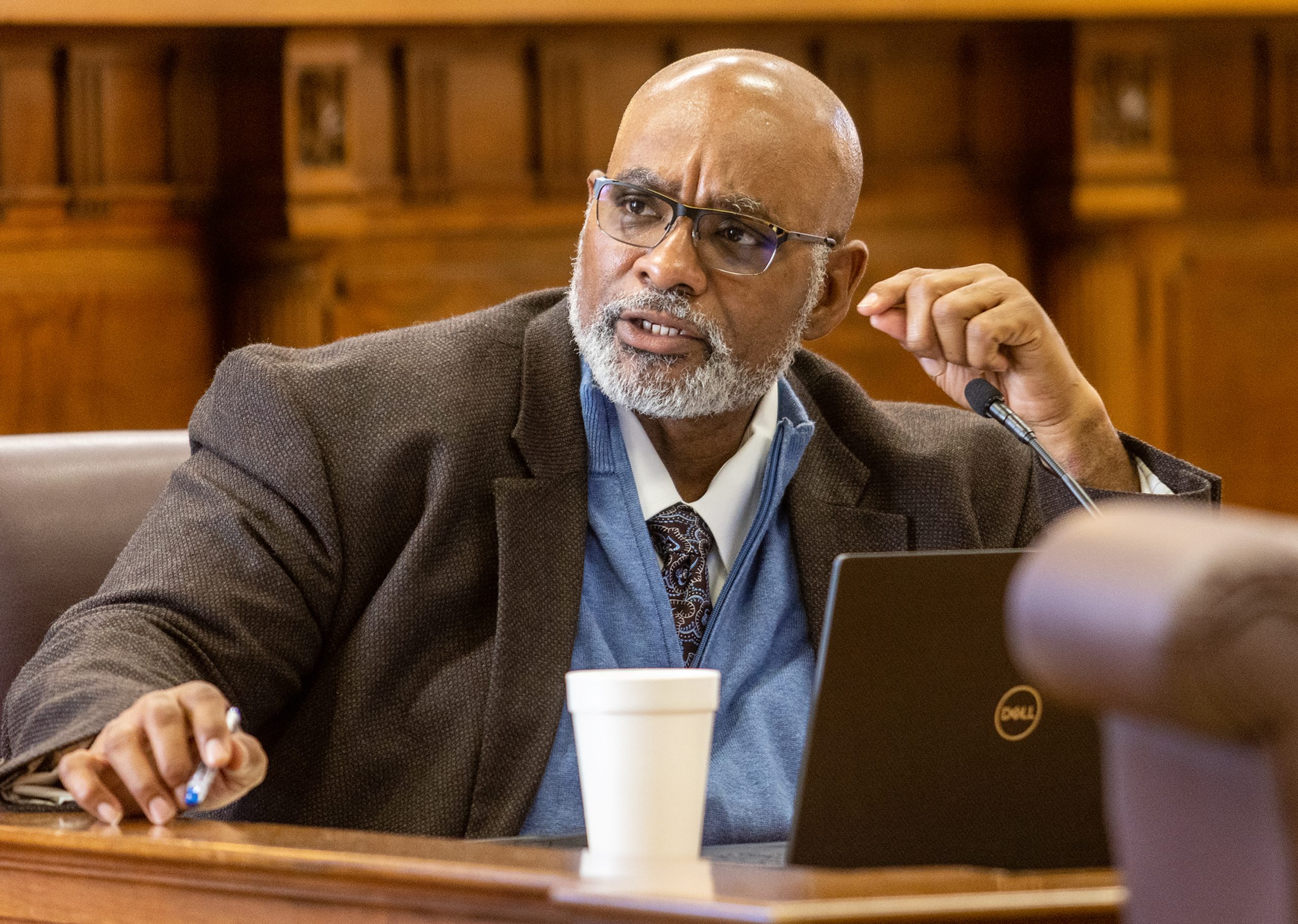Mississippi Today
Proposal to create Delta health authority draws fire from area’s lawmakers

A proposal to manage hospitals and clinics in the Delta under a new authority — and give political power over it to the governor — was met with distrust from the area's lawmakers this week.
Representatives from the Delta Council, an economic development organization that was one of the first non-health care groups to endorse Medicaid expansion, presented a plan Tuesday at a joint meeting between the House and Senate Public Health Committees intended to help preserve health care in the Delta, one of the state's sickest regions.
But the proposal was received poorly by Delta lawmakers, who said this was the first time they were hearing of it.
“I'm just so sick and tired,” said Rep. Otis Anthony, D-Indianola, as murmurs of support echoed around the table. “This is my sixth session, and I'm just sick and tired of people outside of the Delta telling us what we need, and we're not at the table.”
The plan presented by the Delta Council centers on creating a Delta Rural Health Authority, which would manage a consortium of hospitals and health care facilities in the region, including rural medical clinics and federal qualified health centers.
The health care facilities would “collaborate” and share resources in order to expand physician coverage and services in the Delta.
The authority would also have the power to consolidate health care services in the Delta, if it deems appropriate.
Some of the objectives of the authority, the plan says, include maintaining essential health care services and workers in the Delta, maximizing financial outcomes and reimbursement opportunities for the region's health care facilities and, subsequently, improving health outcomes.
The plan would not create new facilities or hospitals, and communities would not be forced to participate.
The Delta Council's Wade Litton started the presentation Tuesday by emphasizing that the proposal is not a result of a few weeks of work — it's been in the works for over 16 months, he said.
The council is asking for $5 million to $10 million from the Legislature to establish the authority.
Baker Donelson lawyer Richard Cowart told legislators that three to five hospitals in the Delta are already interested in being part of the authority, mentioning towns such as Greenville, Greenwood and Clarksdale. The presentation showed three hospitals under the authority — one a critical access hospital, one a rural emergency hospital and the last an acute care hospital.
“Until they know what it is, they're not going to commit to it,” he said. “You have the Delta leadership, health care leaders saying we would like … to take a different approach and we would like your permission to do it.”
Gary Marchand, interim chief executive officer of Greenwood Leflore Hospital, confirmed that the facility is involved with the plan and said hospital leaders have discussed the proposal since late summer last year.
He wouldn't comment on the proposal's promise, aside from saying that the hospital's leaders “agree with efforts to evaluate healthcare service delivery in the Delta.”
Clarksdale is home to Northwest Regional Medical Center. Delta Health System, which spent about $26 million on uncompensated care costs in 2022, is based in Greenville.
Cowart said the authority board would be composed of nine to 12 people. He said the governor would appoint three members, the Legislature would appoint two and then each community, as they joined, would appoint members.
But a draft of a Senate bill establishing the regional authority provided to Mississippi Today shows that the governor would appoint five members to the board. Though a majority would have to be Delta residents, the rest would just have to live in Mississippi.
That clause is the heart of the Democratic lawmakers' concern regarding the health authority — the power that Gov. Tate Reeves would have over it.
More regional health authorities may be established under the draft bill with the governor's approval, and the governor would appoint five members of those authority boards, too. And while the bill says board appointments will “seek to create a competencies-based board that also reflects the racial and ethnic diversity of the region,” Delta lawmakers say that language means that's not guaranteed.
A senator has not formally introduced a bill in the Legislature. The lawmakers' criticism of the proposal also largely stems from what they believe is a lack of community input.
“How do you have a solution when you haven't had community meetings or a broad approach that includes legislators, boards of supervisors, hospital workers and administrators?” Rep. John Hines, D-Greenville, said in an interview. “They haven't been that inclusive. It's old men getting in a room doing what they want to do to keep the money for themselves.”
Hines made note of the Delta's racial composition and the history of decisions made by white people in the South negatively affecting Black people.
“When you live as a Black person in a part of the state where Black people are the majority, they are most in danger when the state has more power over your life than people at the local level,” he said. “Whenever you take the voice of people away from them … you always end up making a community weaker.”
Though the Delta is a historically Black region, the council's 2023-2024 officers appear to be eight white men.
The council's representatives admitted at the meeting that though they had engaged with community members, county supervisors and hospital officials in the Delta, none of the area's legislators had been contacted about the plan.
“Don't you think it would have made sense to have involved people who were investing in these communities to come to the table rather than coming and saying, ‘This is what y'all need to do to survive,'” Hines said at the hearing. “I have some concerns about this. I'm not against a regional approach, but the proposal you presented I do not agree with.”
State Health Officer Dr. Daniel Edney, a Delta native, wouldn't comment on the Delta representatives' opposition to the plan but said the region is running out of health care options.
“This regionalization has proven itself, and the Delta doesn't have many other options to look at,” he said, in an interview following the hearing. “Everybody knows that health care in the Delta needs help. If this isn't it, what is it?”
Anthony, along with other representatives, said Medicaid expansion is a solution to the Delta's dwindling health care infrastructure.
Despite support from the majority of Mississippians and extensive research underlining the policy's financial and health benefits, Gov. Tate Reeves and other Republican leaders have vehemently opposed expansion. Reeves has instead pitched other ideas as alternatives. Rep. Darryl Porter, D-Summit, told Mississippi Today that he believes this authority is the governor's latest attempt to “sidestep Medicaid expansion.”
Forty other states have adopted Medicaid expansion, and researchers say it would generate billions of dollars and thousands of jobs by insuring 200,000 to 300,000 Mississippians.
“These are conversations the governor has refused to have,” Anthony said at the hearing. “We can tell you from the Delta what the problem is.”
Nearly half of the state's rural hospitals are at risk of closure, largely due to uncompensated care costs, or money hospitals spend taking care of uninsured patients.
“The governor wants local hospitals to fail,” said Rep. Jeffrey Harness, D-Fayette, in an interview with Mississippi Today.
The council's plan does not take into account the impact of Medicaid expansion but Cowart noted that the policy would be “very beneficial” to the region, in addition to the proposal.
Anthony said he was “appalled” to hear recommendations from various organizations about the region's health care crisis when stakeholders have been clear about the problem “for the past 30 years.”
“We've been telling this state what we need, and the state has consistently robbed and taken economic opportunity from the Delta,” he said. “It's very disrespectful, when we starve the region economically by not making major economic investments in that area and then coming back and saying, ‘I know what's wrong.'”
Reeves called two special legislative sessions in the past two weeks for lawmakers to spend hundreds of millions of tax dollars to lure businesses to areas outside of the Delta.
While almost the entire Capitol approved the economic deals, several Delta lawmakers previously told Mississippi Today they believe Reeves is using the power of his office to choose which areas of the state thrive and which starve from a lack of economic investment. The governor's office has denied these allegations.
It's not clear who would formally introduce the bill yet, or what its final iteration would be. But as it stands, Hines said he and his colleagues do not support the authority's establishment.
“We are sick and tired of people telling us what to do rather than asking us what we need help with,” he said.
This article first appeared on Mississippi Today and is republished here under a Creative Commons license.
Crooked Letter Sports Podcast
Podcast: It’s crunch time in both college and high school baseball.

We are into the second week of May, which means the college and high school baseball seasons have reached the point where every pitch matters. At present, Mississippi State is a likely 2-seed, Southern Miss is a 3-seed and Ole Miss is on the outside looking in. The Rebels, however, can change that this weekend when No. 1 ranked Texas A&M comes to Oxford. Also, Tyler gives the lowdown on all the high school baseball playoff action.
Stream all episodes here.
This article first appeared on Mississippi Today and is republished here under a Creative Commons license.
Did you miss our previous article…
https://www.biloxinewsevents.com/?p=356732
Mississippi Today
Activist pressing charges against U.S. Rep. Ezell after confrontation over Israel-Hamas war
A Palestinian-American activist is pressing charges against U.S. Rep. Mike Ezell of Mississippi for allegedly assaulting her on Capitol Hill.
Ezell, who is currently running for reelection, was shown in a video posted Tuesday with Sumer Mobarak, a member of a feminist political advocacy group based in California called Code Pink.
One of the activists can be heard asking Ezell about the Israel-Hamas war and whether he thinks Israel should accept a ceasefire proposal or if he wants “this genocide to continue?”
Another person off-camera asks: “You want the killing of my people, my Palestinian people?”
“Oh, why don't you shut up?” Ezell says in response. “Knock it off!” He then appears to reach out with his hand and knock the cellphone filming him to the ground.
The Palestinian-American, identified as Mobarak, has filed an assault complaint against Ezell, according to Code Pink. U.S. Capitol Police told the Associated Press that they are looking into the incident.
“These China-backed protesters want to harass and intimidate Members of Congress into ending our support for Israel and our opposition to Hamas terrorists,” EzeIl said in a statement. “I will not be harassed or intimidated by the Chinese Communist Party, Hamas, or their supporters, and I will continue standing with our Israeli allies against terrorism.”
Code Pink says on its site that “China is not our enemy.” According to a 2023 New York Times investigation, the group—which describes itself as a “feminist grassroots organization working to end U.S. warfare and imperialism, support peace and human rights initiatives”—once criticized China's human rights record but has more recently supported Beijing's internment of mostly Muslim Uyghurs.
Ezell was Jackson County sheriff before he was elected to the U.S. House seat in south Mississippi in 2022. He is seeking reelection this year as the Republican nominee and faces Craig Elliot Raybon, who was unopposed for the Democratic nomination, in November.
This article first appeared on Mississippi Today and is republished here under a Creative Commons license.
Mississippi Today
On this day in 1969


May 8, 1969

Members of the Black Psychiatrists of America interrupted the breakfast of the trustees of the American Psychiatric Association, sharing a list of demands that included a rise in Black leadership, a call to desegregate mental health facilities and a rule to bar psychiatrists guilty of racial discrimination.
Their founding president, Charles Pierce, was especially concerned about television: “American homes have more television sets than bathtubs, refrigerators or telephones; 95 percent of American homes have television sets.”
Convinced that the way to change young hearts would be through television, he became a senior advisor for a new educational show for preschoolers known as “Sesame Street,” which featured a racially diverse cast.
“Sesame Street” would go on to become one of the most successful shows of all time, creating iconic characters that resonate to this day.
This article first appeared on Mississippi Today and is republished here under a Creative Commons license.
Did you miss our previous article…
https://www.biloxinewsevents.com/?p=356507
-
SuperTalk FM6 days ago
Driver’s education set to become mandatory in Mississippi as bill passes
-
SuperTalk FM5 days ago
State approves $160M to expand Highway 7 to four lanes in Lafayette County
-
SuperTalk FM2 days ago
Legislation outlawing ‘squatted’ vehicles in Mississippi signed into law
-
Mississippi News3 days ago
LCSO wants people aware of a scam circling the area
-
Mississippi Today3 days ago
On this day in 1917
-
228Sports1 day ago
PRC’s Bats Come Alive Late As Blue Devils Beat Picayune To Advance To 6A South State Title Series
-
Mississippi News6 days ago
Altercation at Mississippi police department leads to officer-involved shooting
-
Mississippi News3 days ago
Winston Co. Sheriff’s Office investigates shooting at Dave’s Club






































